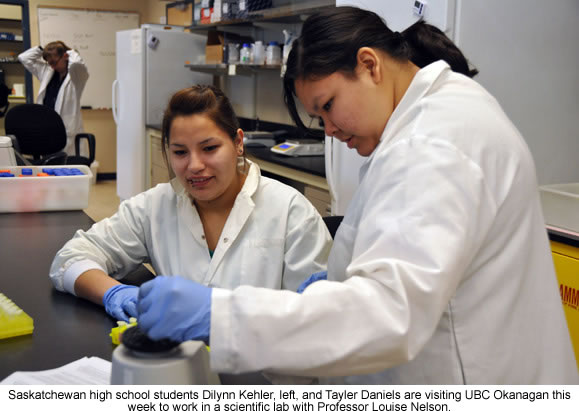 |
Canku Ota
|
 |
|
(Many Paths)
|
||
|
An Online Newsletter
Celebrating Native America
|
||
|
April 1, 2010 - Volume
8 Number 4
|
||
|
|
||
|
Aboriginal Students
Take A Bite Out Of Food Science With Unique Internship
|
||
|
by Ciara Byrne _ The
Canadian Press
|
||
|
credits: photo courtesy
of UBC Okanagan
|
|
TORONTO - Wearing white lab coats, and inquisitive expressions, a group of teens in Toronto huddled around a scientist as he explained the delicate process of transforming cocoa beans into chocolate. First Nations, Metis and Inuit students were trading in a week of freedom for a taste of university life, and taking a small bite out of the unique field known as food science. Under the program called "Be a Food Researcher for a Week," developed by Advanced Foods and Materials Network, 10 aboriginal high-school students have been given the opportunity to work with scientists in several Canadian universities during their spring break. "Food science affects everyone, everyone eats food and many people eat chocolate. If they can find a way to make chocolate healthier, last longer on the shelves ... it's beneficial to everyone," said Jesse Gilbert, 15, of Rivers, Man., who made the trip to Ontario to work in several labs over the week. "I've always been thirsty for knowledge and I came here to learn," she added.
"The chance to be at the university, to have this whole scientific experience, will contribute to a career later on," said Gilbert, "like his job," he added with a smile, gesturing at one of the scientists in the room. The goal of the program is to expose high-school students not only to the field of science, but also to university life. Organizers are hoping as well that it will pique an interest in the subject among aboriginal youth. "We found that aboriginal high-school students are much more likely to go into arts, so they're underrepresented in sciences at the post-secondary level," said Louise Jessup, a spokesperson for the federally funded network. She said that while students can easily picture being a lawyer or doctor, it might be hard to imagine working in a field like food science without knowing exactly what's involved. "Food science is a unique subject because you can talk about chemistry, engineering, microbiology and nutrition," said Subratim Ghosh, a Ryerson University post-doctoral fellow in food science, who has been leading some of the instruction in the lab. "This is to encourage aboriginal people to come to higher education, like university, and to come more into science," he added. For Alanah Levasseur, 18, of Winnipeg, working in a lab in a university environment was a rare chance to explore a future career. "I wanted to experience university because I'm graduating this year," said Levasseur. The teenager said she would like to become a biology teacher. "Before they come to school, it will be nice if they have a first-time experience of how it is to be in a research lab," said Ghosh. Ghosh taught the teenagers about a conching machine, a large device that grinds the chocolate against a hard surface using rollers. During the week, the students were also learning about DNA isolation, the science behind mayonnaise and about proper nutrition. Jessup said the students were beginning to realize that a career in food science can help, through diet, in the battle against such chronic conditions faced by many Canadians as high blood pressure, heart disease and diabetes. |
|
|
||
|
|
||
| Canku Ota is a free Newsletter celebrating Native America, its traditions and accomplishments . We do not provide subscriber or visitor names to anyone. Some articles presented in Canku Ota may contain copyright material. We have received appropriate permissions for republishing any articles. Material appearing here is distributed without profit or monetary gain to those who have expressed an interest. This is in accordance with Title 17 U.S.C. Section 107. | ||
|
Canku Ota is a copyright ©
2000, 2001, 2002, 2003, 2004, 2005, 2006, 2007, 2008, 2009, 2010
of Vicki Barry and Paul Barry.
|
||
 |
 |
|
|
The "Canku
Ota - A Newsletter Celebrating Native America" web site and
its design is the
|
||
|
Copyright ©
1999, 2000, 2001, 2002, 2003, 2004, 2005,
2006, 2007, 2008, 2009, 2010
of Paul C. Barry.
|
||
|
All Rights Reserved.
|
||
 The
teen applied back in September after submitting an essay and two
academic references. Eight students were selected to participate
in the program, which runs out of labs in several universities,
including Ryerson University, University of Toronto and the University
of Guelph. Two other students were working in labs at the University
of British Columbia.
The
teen applied back in September after submitting an essay and two
academic references. Eight students were selected to participate
in the program, which runs out of labs in several universities,
including Ryerson University, University of Toronto and the University
of Guelph. Two other students were working in labs at the University
of British Columbia.